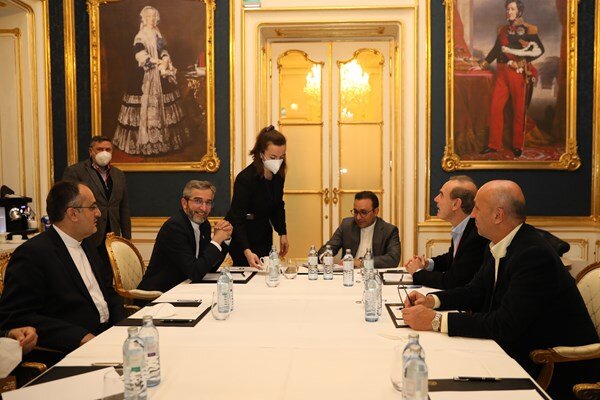Europe shows its true colors

TEHRAN - The European parties to the 2015 Iran nuclear deal have launched a full-on assault on Iran in the wake of the last round of Vienna talks, accusing it of presenting unrealistic and maximalist demands.
The last round of Vienna talks was concluded on Friday noon after long days of intensive, and in some cases stressful, negotiations between senior diplomats from Iran and the P4+1 group of world powers – France, Britain, Russia, and China plus Germany.
The talks were resumed last week after a five-month hiatus during which Iran prepared detailed draft proposals regarding nuclear- and sanctions-related measures to be taken by Iran and the other sides.
During the talks, Iranian negotiators presented two of these proposals. The total number of Iranian drafts is three, with the third proposal is to be presented after receiving the European response.
But instead of reviewing and then providing a detailed, fact-based response to the Iranian proposals, the Europeans, together with their American allies, chose to shorten the talks and launch a cognitive media warfare against Iran by labeling it as the culprit for the alleged failure of the talks.
The Europeans trotted out the same positions they voiced before the resumption of the talks: that Iran pursues maximalist demands and is not serious about the talks.
They said the Iranian negotiators staked out positions that are incompatible with the 2015 deal, also known as the Joint Comprehensive Plan of Action (JCPOA), according to the New York Times.
This while Iran’s lead negotiator, Ali Bagheri Kani, told Al-Jazeera that Iran’s “proposals to world powers cannot be rejected and based on the terms of the 2015 agreement.”
Also, a source familiar with the talks, told Press TV that the Iranian-drafted proposals are “in full conformity with the 2015 nuclear agreement and the principles contained therein.”
“Regrettably, some European parties have mistaken the negotiating table for a platform to dictate their positions and demands,” the source added.
But while Iran kept lamenting the lack of seriousness on the European side, the Europeans were busy feeding western media with quotations putting the blame on Iran.
Western diplomats told Politico that Iran had put forth new proposals during the week of talks that left almost no basis for further conversations about returning to the agreement that limited Iran’s nuclear program in exchange for sanctions relief.
“Tehran is walking back almost all of the difficult compromises crafted after many months of hard work, and demands major changes to the text,” senior European diplomats from Britain, France, and Germany said after the talks broke up on Friday, according to Politico.
The E3 - France, Germany, and the UK- reiterated this in a joint statement. “This week, it [Iran] has backtracked on diplomatic progress made. Iran is breaking with almost all of the difficult compromises crafted in months of tough negotiations and is demanding substantial changes to the text” that undermine the draft, which was between 70 and 80 percent finished, they said, according to the New York Times.
The statement added, “Some proposals by Iran are inconsistent with the JCPOA and some go beyond the provisions of the JCPOA.”
The European kerfuffle over the Iranian proposals came at a time that Iran is logically using its right to submit draft proposals. But the European fuss over the proposals creates the impression that Iran should have not presented proposals in the first place. This is a non-starter because Iran as a vital negotiating partner has the right to propose changes to any draft agreement.
By fostering a one-sided negotiating atmosphere, the Europeans returned to their old habit of adopting dubious positions. On the one hand, they pretend to be keen to salvage the JCPOA. On the other, they reject any constructive move that may pave the way for a negotiated agreement.
At any rate, the Europeans are the last to question Iran’s positions in Vienna. Over the past few years since the U.S. withdrawal from the JCPOA in May 2018, the Europeans did nothing to save the deal. They only put the onus on Iran to protect it. And Iran worked patiently to preserve the deal while chafing under U.S. blanket sanctions. Now, instead of rewarding Iran, the Europeans want more concessions from Iran.
Leave a Comment